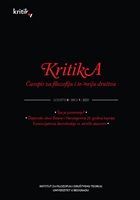ŠTA POKAZUJU ARGUMENTI HOLANDSKE KNJIGE?
WHAT DO THE DUTCH BOOK ARGUMENTS SHOW?
Author(s): Nenad FilipovićSubject(s): Methodology and research technology, Social Theory
Published by: Institut za filozofiju i društvenu teoriju
Keywords: subjective interpretation of probability; Dutch Book; degree of belief; Kolmogorov; De Finneti;
Summary/Abstract: The Dutch Book Arguments are one of the main reasons for the great success of the subjective interpretation of probability. These arguments helped the subjective interpretation to become a serious candidate for an interpretation of the axioms of probability theory during the period in which there was a certain tendency towards an objectivist and epistemic interpretative direction. Later, the subjective interpretation along with the Dutch Book Arguments was greatly developed in technical terms and became widely used in various scientific fields (e.g. decision and game theory) in which there was a need for probability theory. In this article, we will show how and why the Dutch Book arguments were essential for the subjective interpretation during its development, which additions to the arguments were made later, and then we will show the main substantive assumptions of the argument. Finally, we will analyze the plausibility of the assumptions and show that, in order to preserve the goals and conclusions of the Dutch Book Arguments, we should adopt a version of interpretative primitivism within the subjective interpretation of probability.
Journal: Kritika: časopis za filozofiju i teoriju društva
- Issue Year: 2/2021
- Issue No: 1
- Page Range: 55-68
- Page Count: 14
- Language: Serbian

